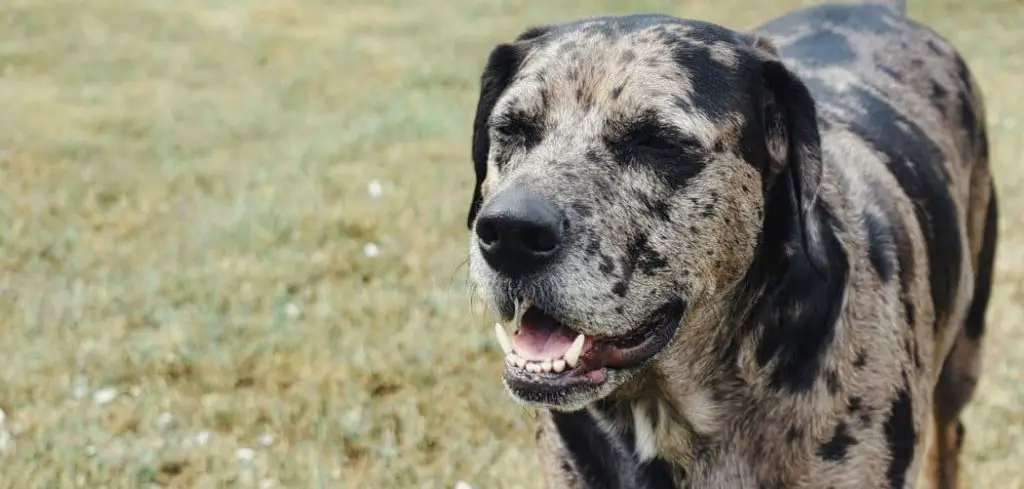When an old dog is panting and not eating, it often signals more than just aging—it could be a sign that your senior pet is in pain, unwell, or emotionally distressed.
While some slowing down is expected with age, sudden or persistent panting combined with appetite loss isn’t normal.
For older dogs, these symptoms can indicate age-related illnesses that require your attention and possibly medical intervention.
Old Dog Panting and Not Eating: Why It Happens
When your old dog is panting and not eating, it may be due to age-related conditions such as heart disease, joint pain, cognitive decline, kidney issues, infection, or even stress.
As dogs age, their bodies become more sensitive to temperature changes, physical discomfort, and internal disease. Panting may be your dog’s way of coping with pain or difficulty breathing, while appetite loss typically reflects nausea, fatigue, or discomfort.

Old Dog Panting and Not Eating: Common Causes
Heart Disease
Senior dogs are particularly prone to heart problems like congestive heart failure.
These conditions often present as panting at rest, fatigue, reluctance to exercise, and a loss of appetite.
As the heart weakens, it struggles to pump blood efficiently, leading to fluid buildup in the lungs or abdomen.
If your old dog is coughing, breathing rapidly, or seems uncomfortable lying down, a heart issue may be the cause.
Diagnosis and management by a vet can significantly improve quality of life.
Pain from Arthritis or Degenerative Joint Disease
Many older dogs develop arthritis, which causes chronic joint pain and stiffness.
Pain can increase panting as the dog attempts to manage discomfort, particularly after rest or during weather changes.
If your senior dog is also not eating, they may be in too much pain to get up or feel too uncomfortable to eat. Look for signs like limping, slower movement, difficulty standing, or licking at joints.
Medications, supplements, and lifestyle adjustments can help ease their pain.
Cognitive Dysfunction (Dog Dementia)
Just like humans, older dogs can suffer from cognitive decline. Canine Cognitive Dysfunction (CCD) can lead to confusion, anxiety, disrupted sleep cycles, and behavioral changes like pacing and panting.
Dogs with CCD may forget routines, become disoriented, or even lose interest in eating.
While there’s no cure, early management with diet, medications, and environmental enrichment can improve their daily comfort and slow progression.
Related: Dog diarrhea and not eating (Causes and when to worry)
Kidney or Liver Disease
Organ function naturally declines with age. Kidney or liver disease can cause toxin buildup in the body, leading to nausea, loss of appetite, and increased respiratory effort—manifesting as panting.
Dogs with kidney issues may also drink excessively or urinate more frequently, while liver disease can lead to yellowing of the eyes or gums.
Routine senior bloodwork is essential to catch these issues early and manage them effectively.
Infection or Fever
Older dogs have weaker immune systems and may develop infections more easily.
A urinary tract infection, pneumonia, or even dental abscess can cause panting, fatigue, and refusal to eat.
A low-grade fever or inflammation can make your dog feel miserable, and they may try to isolate themselves or appear disoriented.
Watch for additional signs like nasal discharge, swelling, bad breath, or lethargy that indicate infection.
Anxiety or Environmental Stress
Senior dogs may become more sensitive to stress as they age. Changes in the household, new pets, loud noises, or even separation can cause your older dog to pant and avoid food.
Panting is a common sign of stress or anxiety in dogs, and as they grow older, they may not adapt as easily to change.
Keeping a consistent routine, using calming supplements, and offering comfort can help reduce emotional distress.
What to Do If Old Dog Panting and Not Eating Happens
Start by making your senior dog comfortable. Ensure they’re in a cool, quiet area with access to fresh water.
Offer small amounts of soft, bland food such as boiled chicken and rice. Take note of any additional symptoms like coughing, limping, disorientation, vomiting, or changes in bathroom habits.
Monitor their breathing—if it’s labored or shallow, you should act quickly.
Make sure your dog isn’t in pain. Try gently palpating their body and limbs to see if they react.
If they seem sore, lethargic, or just not like themselves, it’s best to consult your veterinarian.
In elderly dogs, small problems can quickly escalate without prompt care.
When to Call or Visit Your Vet
Contact your vet promptly if:
Your senior dog hasn’t eaten in over 24 hours
Panting occurs at rest or during sleep
There are signs of pain, limping, or stiffness
Your dog seems confused, disoriented, or withdrawn
Vomiting, diarrhea, or difficulty breathing occurs
You notice yellow gums, bad breath, or excessive urination
Because older dogs are more vulnerable, even subtle changes in behavior can point to serious health issues. Getting a diagnosis early can significantly improve your dog’s comfort and quality of life.
Related: Dog Panting and Not Eating (Here’s why)
Key Takeaway
Panting and not eating in an old dog should never be dismissed as “just getting older.” While aging naturally brings some changes, this specific combination of symptoms usually points to discomfort, illness, or emotional distress. Your senior dog relies on you to notice these signs and act quickly.
With the right care, medical support, and compassion, you can help your older dog stay comfortable and enjoy their golden years.
Pay attention to their behavior, stay on top of vet checkups, and never hesitate to ask questions when something doesn’t feel right.
